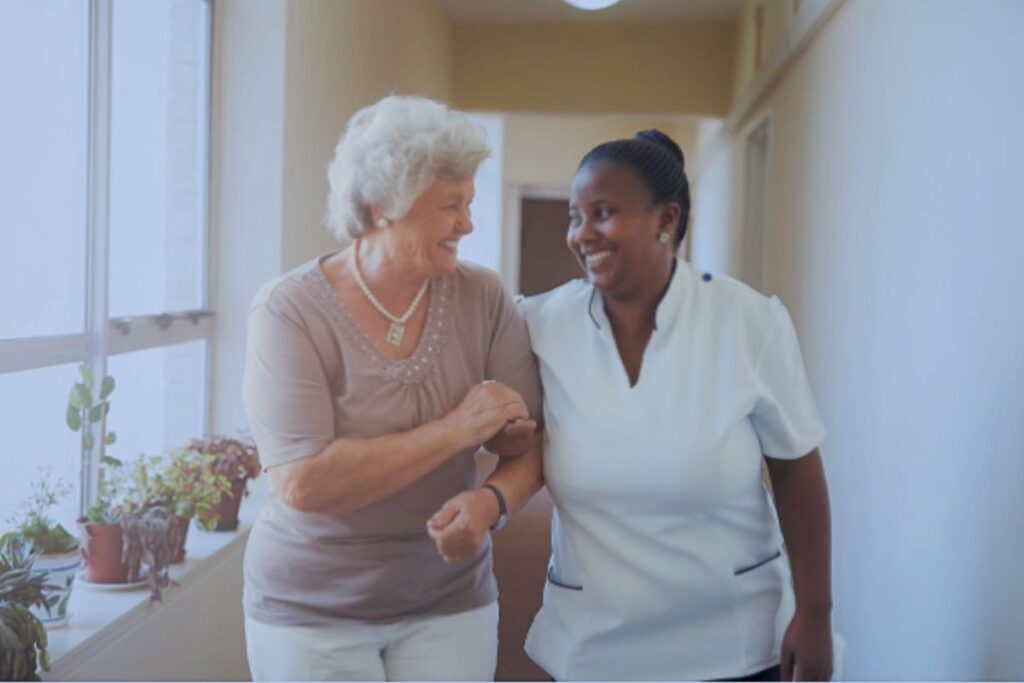7 Life-Changing Benefits of Choosing Home Health Care for Seniors

As more individuals relocate or are busy owing to employment, education, improved living conditions, and other opportunities, there are instances where seniors may be left behind.
As per the National Health and Aging Trends Study (NHATS), approximately 41.4 percent of the total population studied in the USA did not receive elderly care, even though they struggled with chronic disorders and had difficulty in tasks related to self-care, mobility, or household chores.
Earlier, the sole recourse for families was often admitting their elderly relatives to long-term care facilities. However, nowadays, families have the alternative of exploring in-home care as a viable option.
What Is In-Home Care?
In-home care for seniors refers to professional support services provided to individuals within the comfort of their own homes. These services cater to various needs and offer varied home care benefits, including assisting aging individuals in maintaining independence, managing chronic health conditions, recovering from medical challenges, or accommodating special needs and disabilities. Skilled caregivers and therapists offer both short-term and long-term care within the home based on the individual's specific requirements.
Types of Home Care Services
There are multiple types of home care services for seniors; these include:
1. Time-specific home care services
You might need assistance for your seniors at various times of the day. Owing to this necessity, in-home care is available for different durations, which are:
- Hourly Care: Support for a few hours a day
- 24/7 Live-In Care: Caregivers stay in the client's home around the clock, providing assistance day and night
- Overnight Care: Assistance during night hours
2. Respite Care
Temporary care to provide family caregivers with a break. This can be arranged for just a few hours or for several days.
3. Palliative Care
This specialized medical care focuses on providing the elderly relief from the symptoms and stress of a serious illness, with the goal of improving the quality of life for both the patient and the family.
4. Hospice Care
Supportive/ Hospice care is provided at the end of life, focusing on comfort and quality of life rather than curative treatment.
5. Companion Care/ aides
Home health aides provide assistance with fundamental personal tasks, including mobility support, bathing, and dressing. Certain aides undergo specialized training to offer more advanced care under the supervision of a nurse.
Benefits of Home Care
You can leverage a wide range of benefits of home health care for the elderly, which are:
Promotes Independence
One of the key benefits of senior home care is that it helps your elderly loved one maintain a level of autonomy. Home care workers visit as needed, providing essential assistance while allowing your elders the freedom to engage in daily activities, hobbies, and social life at their own pace.
Customized to Their Unique Needs
Unlike care homes or senior living communities, which may not always cater to individual needs, home care is highly personalized. In-home care programs are tailored to meet the specific requirements of your loved one, offering the exact type and level of support they need. The one-to-one attention provided by in-home care fosters a strong, close relationship between your loved one and their caregiver, ensuring they feel safe, nurtured, and comforted.
Specialized Care for Complex Health Needs
Your elderly might have health conditions requiring specialized care beyond your capabilities. Older adults managing multiple medications may struggle with their prescription schedules or forget doses altogether. A professional caregiver ensures accurate administration of medications, helping to manage health concerns and prevent adverse drug interactions.
Enhanced Peace of Mind for Family Caregivers
For family members caring for aging relatives, home care offers significant peace of mind. Professional caregivers act as your eyes and ears, keeping you continually updated on your loved one’s health and home environment. This allows you to focus on other areas of your life and reduces the stress associated with caregiving.
Assistance with Daily Living Activities
A trained home care assistant can support your aging relative with activities of daily living (ADLs) such as grooming, dressing, bathing, and medication reminders. By assisting with personal care, seniors can maintain their independence and dignity.
Professional caregivers can also help with household tasks that may become challenging for elders. Assistance with chores like vacuuming, washing dishes, and other small tasks ensures your loved one lives in a clean, healthy, and safe environment.
Reducing Loneliness and Isolation
Isolation is a growing concern among the elderly. Loneliness can lead to or worsen health issues such as depression. A professional caregiver provides companionship, offering your loved one someone to talk to and interact with. They can accompany seniors on walks, errands, and doctor’s appointments, as well as engage in activities like games, puzzles, or movie outings.
There are multiple home care benefits to leverage from. With a variety of services ranging from basic personal care to complex medical support, home health care emerges as a cost-effective and compassionate alternative to traditional long-term care facilities.
Family Ties Home Care is a well-known provider of in-home care services tailored specifically for the elderly in need of assistance. If you need professional services for home care for elderly, call 805-917-6680 and discover how our compassionate and professional services can enhance your family's quality of life.
